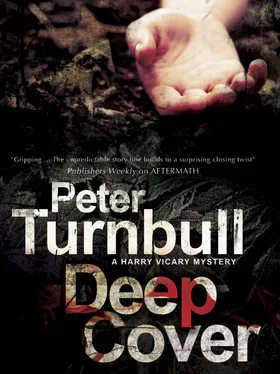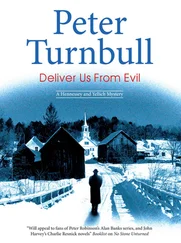Peter Turnbull - Deep Cover
Здесь есть возможность читать онлайн «Peter Turnbull - Deep Cover» весь текст электронной книги совершенно бесплатно (целиком полную версию без сокращений). В некоторых случаях можно слушать аудио, скачать через торрент в формате fb2 и присутствует краткое содержание. Жанр: Полицейский детектив, на английском языке. Описание произведения, (предисловие) а так же отзывы посетителей доступны на портале библиотеки ЛибКат.
- Название:Deep Cover
- Автор:
- Жанр:
- Год:неизвестен
- ISBN:нет данных
- Рейтинг книги:4 / 5. Голосов: 1
-
Избранное:Добавить в избранное
- Отзывы:
-
Ваша оценка:
- 80
- 1
- 2
- 3
- 4
- 5
Deep Cover: краткое содержание, описание и аннотация
Предлагаем к чтению аннотацию, описание, краткое содержание или предисловие (зависит от того, что написал сам автор книги «Deep Cover»). Если вы не нашли необходимую информацию о книге — напишите в комментариях, мы постараемся отыскать её.
Deep Cover — читать онлайн бесплатно полную книгу (весь текст) целиком
Ниже представлен текст книги, разбитый по страницам. Система сохранения места последней прочитанной страницы, позволяет с удобством читать онлайн бесплатно книгу «Deep Cover», без необходимости каждый раз заново искать на чём Вы остановились. Поставьте закладку, и сможете в любой момент перейти на страницу, на которой закончили чтение.
Интервал:
Закладка:
‘No. . no. . where in here? Where in this office did he go?’
‘Well, he went into the back office.’ Dunwoodie indicated the door behind to the left of him. ‘He keeps that door locked; even I can’t go inside there. I don’t know what’s in there.’
‘Even you?’
‘Well, I mean that I am the office manager and I can’t go in that room. All I need to access are the files kept in the cabinets. Everything I need is in those cabinets.’
‘I see, so where else did he walk?’
‘Nowhere. . just into the back office, watered the plants, then left to view the property Mr William hopes to acquire.’
‘He watered the plants?’
‘Yes.’ Dunwoodie pointed to a row of six money plants that stood on top of the filing cabinets in terracotta pots.
Brunnie noticed a small, red plastic watering can at the end of the row of money plants. ‘Did he use that watering can?’
‘Yes. . yes, he did.’
Brunnie walked across the hard-wearing felt carpeting and picked the watering can up by the spout. He took a large plastic bag from the inside of his coat and placed the can within it. ‘This will do nicely.’ He smiled.
‘Can you do that?’ Dunwoodie spluttered.
‘With your permission,’ Yewdall said, also smiling.
‘Well, I don’t. . I mean. .’
‘Thanks.’ Brunnie turned toward the door. ‘We’ll return it.’
‘Did you buy it locally?’ Yewdall asked.
‘Yes, the hardware shop, five minutes’ walk from here.’
‘So go and buy another one, an identical one, then no one will ever know, will they?’
‘I will have to tell Mr William,’ Dunwoodie squeaked.
‘No,’ Brunnie turned back and faced Dunwoodie, holding eye contact with him. ‘No. No. No. For your own sake. . no.’
‘For my own sake?’ Dunwoodie’s face paled.
‘Yes, for your own sake.’ Brunnie remained stone-faced. ‘Lock up the office and go and buy a watering can from the hardware shop. A watering can identical to this one, and return and place it on top of the filing cabinets.’
‘Simple as that,’ Yewdall added.
‘You know, fella,’ Brunnie continued, ‘I don’t know what you think of your boss, but I can tell you that it won’t be the same as what I think about him. So go and buy another watering can and mention our little and very brief visit to no one.’
‘No one,’ Yewdall added, ‘no one.’
In the car, driving southwards in slow moving traffic, Yewdall glanced to her left at the residential houses and occasional shop. ‘Any more stunts like that,’ she said, ‘and you’ll have us both put against a wall and shot.’
Brunnie grinned. ‘You put the idea in my head, but at least we’re going to find out who Pilcher really is, and Dunwoodie will be safe if he buys another watering can and keeps his mouth shut.’
Yewdall turned to him. ‘If,’ she said coldly, ‘if, it’s a big if. . a very big if.’
Vicary smiled. It was serious. Very serious, but he managed to smile. In the margin of the report on Michael ‘Irish Mickey’ Dalkeith’s blood toxicity, which spoke of milligrams per millilitre of alcohol being present, John Shaftoe had clearly anticipated Vicary’s bewilderment and had written in a neat hand, ‘sufficient to knock out a horse’. Vicary said ‘Thank you’ aloud and laid the toxicity report to one side, and picked up the post-mortem report, also submitted by John Shaftoe, in respect of the shallowly buried, skeletonized corpse which was found beneath Michael Dalkeith’s frozen body. The post-mortem findings had been compared to information on missing persons and Vicary saw that, worryingly, quite a few women of about five feet tall in height had been reported missing, and were still missing, in the Greater London area within the last fifteen years. The vast majority, however, were very young — teenagers or early twenties — but one, just one missing person’s report stood out as being the most promising potential match to the post-mortem findings. Rosemary Halkier was thirty-five years old when she was reported missing some ten years earlier. The mother of two children, she had been reported as a missing person by her father with whom she was living at the time in Albert Road, Leyton, which was, as if fate was helpfully intervening, very close to Vicary’s route home. If he left the tube train just one stop earlier than usual, he could very easily call in at the Halkier household, make a brief enquiry and then walk home from there in less than fifteen minutes. Vicary glanced out of his office window. He noted the sky to be low and grey but, thankfully, it was not raining, and as such it made a stroll from Leyton to Leytonstone on a dry winter’s evening seem very inviting. Very inviting indeed. He stood and worked himself into his overcoat and screwed his fedora hat on to his head. He signed himself ‘Out — not coming back’, and walked out of the Murder and Serious Crime Unit. He took the lift to the ground floor and exited New Scotland Yard by the main entrance in front of the triangular sign which read, ‘Working for a safer London’. He took the District Line to Mile End and there changed on to the Central Line and, as he had planned, left the tube at Leyton.
Albert Road revealed itself to be a residential street lined with solid Victorian terraced housing, but was interspersed with post-Second World War development on the southern side, which, as very frequently in London and other cities in the UK, indicated where bombs had fallen during the Blitz. The Halkier household was, like the houses around it, a clear survivor of Nazi bombs: brick built, white-painted around the front bay window, and a black-gloss-painted door with a brass knocker. A small front garden of just four feet separated the house from the pavement. Vicary pushed open the low metal gate, which squeaked on dry hinges as he did so, and was, whether by design or not, he thought, a very efficient burglar deterrent. He rapped on the brass knocker, employing the traditional police officer’s knock. . tap, tap. . tap. The door was opened rapidly by a slender, healthy looking man who Vicary assessed to be in his late sixties.
‘What!’ the man demanded, aggressively.
‘Police.’ Vicary showed the man his ID. ‘No trouble, just seeking information.’
‘Oh. . I see.’ The man instantly relaxed. ‘It can get bad round here, kids knocking on doors and then running away. Dare say it could be worse. I moved the old knocker higher up the door but they can still reach it.’ The man spoke with a warm London accent. ‘And if it’s not kids, it’s folk trying to sell me double glazing.’
‘Well, I’m not either one,’ Vicary replied softly. Behind the man he saw a neat, well-ordered hallway with everything just so, and the smell of furniture polish from within the house reached him. He stood on the threshold, but still out of doors. ‘Can I ask, are you Mr Halkier?’
‘Yes, that I am. Joseph Halkier. Why?’
‘Did you report your daughter as a missing person some ten years ago?’
‘Yes. .’ The man’s voice seemed to rise in its pitch. ‘Yes, our Rosemary. Why?’
‘I’m afraid I may have some bad news for you.’
Joseph Halkier stiffened. ‘After this length of time, there can be no bad news. If it’s about our Rosemary it can only be good news, even if her dear old body has been found that’s still good news, because it’s better than not knowing.’ He stepped aside. ‘You’d better come in, sir.’
Vicary stepped over the threshold and wiped his shoes on the ‘welcome’ mat just inside the doorway. Joseph Halkier, dressed in a blue sweater, jeans and sports shoes — which made him appear younger than his likely years — shut the door behind Vicary with a gentle click and asked him to go into the first room on his right, which transpired to be the living room of the home. It was furnished with a 1950s vintage three-piece suite, heavy 1930s vintage wooden furniture and a dark-brown carpet. The room had a surprisingly musty smell, and that, and the absence of any form of heating, suggested to Vicary that the room was designated to be the ‘best’ room of the house, used only on special occasions or to entertain official callers. The day-to-day living in the house — including the television, radio and music player and the heating — was likely to be confined to the rear of the house. Joseph Halkier followed Vicary into the room and indicated the armchairs and the settee, and said, in a sombre, resigned tone, ‘Please do take a seat, sir.’
Читать дальшеИнтервал:
Закладка:
Похожие книги на «Deep Cover»
Представляем Вашему вниманию похожие книги на «Deep Cover» списком для выбора. Мы отобрали схожую по названию и смыслу литературу в надежде предоставить читателям больше вариантов отыскать новые, интересные, ещё непрочитанные произведения.
Обсуждение, отзывы о книге «Deep Cover» и просто собственные мнения читателей. Оставьте ваши комментарии, напишите, что Вы думаете о произведении, его смысле или главных героях. Укажите что конкретно понравилось, а что нет, и почему Вы так считаете.












